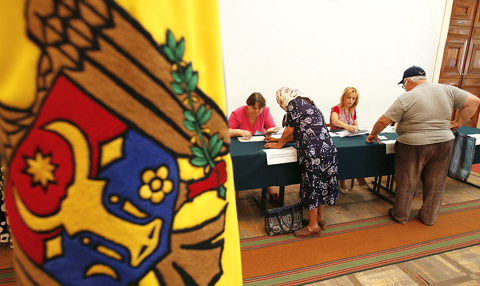Three months after accusations of government vote-rigging touched off street violence, Moldovans began voting yesterday in parliamentary elections that could shift the former Soviet republic’s focus away from Russia and toward the EU.
Polls suggested the ruling Communist Party was leading with about 31 percent, but analysts said four pro-European parties could win a combined 33 percent and form an alliance to elect the impoverished country’s next president and move the country toward the West.
About one in four of the nation’s 2.6 million eligible voters were still undecided, a June 26 to July 10 poll by the Institute for Public Politics showed. It gave a margin of error of plus or minus 2.5 percentage points.

PHOTO: REUTERS
Moldova has been in political paralysis since April 5 parliamentary elections sparked violent protests, with the opposition claiming the balloting was rigged.
At least three people were killed and hundreds of others arrested after protesters — some of whom used the social network Twitter to organize after cellphone networks went down — stormed parliament and the offices of Moldovan President Vladimir Voronin.
Yesterday’s election was overshadowed by the world economic downturn, which has exacted a heavy toll on Moldova. The country’s average monthly wage is only US$350 and the IMF has warned that its GDP will tumble by 9 percent this year.
“On one hand, we either have European integration, or if the Communist Party continues in power, then we have the same situation as we had up to now: no proper reforms, only political statements that do not correspond to reality,” said Vlad Lupan, a political analyst.
The Communist Party, led by Voronin — who has been president since 2001 — took the most votes in April’s election but failed to win enough parliamentary seats to elect a successor. Voronin already has served the maximum two terms.
After the protests, opposition parties boycotted the vote in parliament for a new leader. Twice, lawmakers failed to vote in a president. That led to parliament being dissolved, which in turn triggered the latest elections. Parties need to win at least 5 percent of the vote to earn a seat in parliament.
Although few expect a repeat of April’s violence — in part because a harsh crackdown has intimidated many opposition supporters — tensions were high ahead of the vote.
Early yesterday, unknown people were stopping voters casting their ballot in the village of Corjova, which is located in a separatist region, although the mayor is loyal to the government in Chisinau, the Central Electoral Committee said. Some 1,500 residents are eligible to vote there.
If the four main opposition parties win a majority of parliament’s 101 seats, they are likely to form an alliance which would realign the country with the EU.
More than 3,000 foreign and Moldovan observers were monitoring the elections.

Former Nicaraguan president Violeta Chamorro, who brought peace to Nicaragua after years of war and was the first woman elected president in the Americas, died on Saturday at the age of 95, her family said. Chamorro, who ruled the poor Central American country from 1990 to 1997, “died in peace, surrounded by the affection and love of her children,” said a statement issued by her four children. As president, Chamorro ended a civil war that had raged for much of the 1980s as US-backed rebels known as the “Contras” fought the leftist Sandinista government. That conflict made Nicaragua one of

COMPETITION: The US and Russia make up about 90 percent of the world stockpile and are adding new versions, while China’s nuclear force is steadily rising, SIPRI said Most of the world’s nuclear-armed states continued to modernize their arsenals last year, setting the stage for a new nuclear arms race, the Stockholm International Peace Research Institute (SIPRI) said yesterday. Nuclear powers including the US and Russia — which account for about 90 percent of the world’s stockpile — had spent time last year “upgrading existing weapons and adding newer versions,” researchers said. Since the end of the Cold War, old warheads have generally been dismantled quicker than new ones have been deployed, resulting in a decrease in the overall number of warheads. However, SIPRI said that the trend was likely

BOMBARDMENT: Moscow sent more than 440 drones and 32 missiles, Volodymyr Zelenskiy said, in ‘one of the most terrifying strikes’ on the capital in recent months A nighttime Russian missile and drone bombardment of Ukraine killed at least 15 people and injured 116 while they slept in their homes, local officials said yesterday, with the main barrage centering on the capital, Kyiv. Kyiv City Military Administration head Tymur Tkachenko said 14 people were killed and 99 were injured as explosions echoed across the city for hours during the night. The bombardment demolished a nine-story residential building, destroying dozens of apartments. Emergency workers were at the scene to rescue people from under the rubble. Russia flung more than 440 drones and 32 missiles at Ukraine, Ukrainian President Volodymyr Zelenskiy

Indonesia’s Mount Lewotobi Laki-Laki yesterday erupted again with giant ash and smoke plumes after forcing evacuations of villages and flight cancelations, including to and from the resort island of Bali. Several eruptions sent ash up to 5km into the sky on Tuesday evening to yesterday afternoon. An eruption on Tuesday afternoon sent thick, gray clouds 10km into the sky that expanded into a mushroom-shaped ash cloud visible as much as 150km kilometers away. The eruption alert was raised on Tuesday to the highest level and the danger zone where people are recommended to leave was expanded to 8km from the crater. Officers also